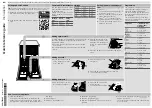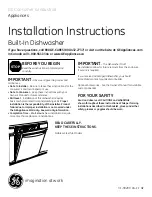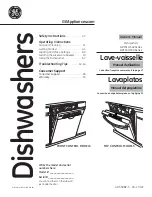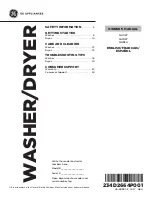
9
Connecting to Water and Electrical Supply
1. Run water at the faucet until it is hot. Turn the water off.
2. Pull the hoses out of their storage compartment on the back
of the dishwasher.
NOTE: Make sure the hoses are not kinked or twisted. Kinked
hoses reduce washing performance.
3. Pull down on the locking collar while lifting the hose
connector onto the faucet adapter.
4. When the connector snaps into place, release the locking
collar.
5. Turn the hot water on slowly until it is all the way on.
6. Plug into a grounded 3 prong outlet.
Using the Faucet
You can draw water from the faucet while the dishwasher is
connected.
NOTE: Do not draw water while the dishwasher is filling or while
water is being pumped out. (This helps prevent a low fill when
dishwasher is filling or mixing drain water with fresh water when
dishwasher is draining.)
Press the red button on the hose connector to draw water from
the faucet. (The faucet is set on hot. Adjust the faucet for the
water temperature you want.)
NOTE: Turn the hot water back on after you draw water from the
faucet. Turn off the cold water.
Disconnecting the Dishwasher
1. Turn the hot water off. (This can be done after the last rinse.)
2. Press the red button on the connector to release the water
pressure.
3. Lift slightly on the hose connector while pulling down the
locking collar. Pull down on the connector.
4. Empty any remaining water from the connector by turning the
connector upside-down.
5. Unplug the power supply cord and return it to the storage
compartment.
6. Return the hoses to the storage compartment.
DISHWASHER LOADING
Loading Suggestions
■
Remove leftover food, bones, toothpicks and other hard
items from the dishes. It is not necessary to rinse the dishes
before putting them into the dishwasher. The wash module
removes food particles from the water. The module contains a
chopping device which will reduce the size of food items.
NOTE: If hard items such as fruit seeds, nuts, and eggshells
enter the wash module, you might hear chopping, grinding,
crunching, or buzzing sounds. These sounds are normal
when hard items enter the module. Do not let metallic items
(such as pot handle screws) get into the wash module.
Damage can occur.
■
It is important for the water spray to reach all soiled surfaces.
■
Load dishes so they are not stacked or overlapping, if
possible. For best drying, water must be able to drain from all
surfaces.
■
Make sure pot lids and handles, pizza pans, cookie sheets,
etc., do not interfere with the spray arm rotation.
■
Run a rinse cycle to keep dishes moist if you do not plan to
wash them soon. Foods such as eggs, rice, pasta, spinach,
and cooked cereals may be hard to remove if they are left to
dry over a period of time.
Quiet operating tips
To avoid thumping/clattering noises during operation:
■
Make sure lightweight load items are secured in the racks.
■
Make sure pot lids and handles, pizza pans, cookie sheets,
etc., do not touch interior walls or interfere with the rotation of
the spray arm.
■
Load dishes so they do not touch one another.
NOTE: For built-in models, keep sink drain plugs closed during
dishwasher operation to prevent noise transfer through drains.
A. Faucet adapter
B. Locking collar
C. Hose connector
A
B
C
A. Faucet adapter
B. Locking collar
C. Red button
D. Hose connector
A
B
C
D
Содержание 8575990
Страница 22: ...22 Notes ...










































